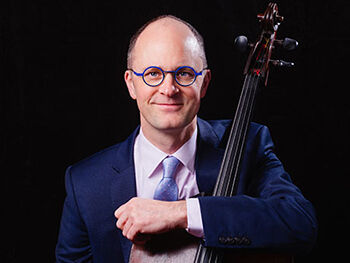University News Last updated 09 May 2025

Head of Strings Nicholas Britton Trygstad is a seasoned performer who has also taught cello for 15 years at the Royal Northern College of Music. In his role at RBC, he enjoys hearing students of all ages develop and improve, as well as ensembles creating a convincing musical experience.
What are the core skills or areas of expertise that you bring to RBC?
I come to RBC with two decades of professional performing experience. I was principal cellist of the Hallé Orchestra for 19 years, and that offered me the opportunity to play some of the greatest music with some of the greatest musicians. Being a principal player in an orchestra brings so much more than all the wonderful orchestral repertoire and orchestral solos. I had the chance to collaborate with many wonderful soloists in chamber music settings, perform concertos around the UK and also represent and advocate for the orchestra and its musicians. I also taught cello for 15 years at the Royal Northern College of Music, as well as coaching youth orchestras such as the National Youth Orchestra. I always loved teaching and helping others on their musical journeys, and I’m delighted to work in education full time now.
What have been your highlights since you started at BCU?
The highlight is always hearing a student improve or an ensemble really pull together to create a convincing musical experience. Our Fauré and His World festival in November 2024 was particularly gratifying because we had so many fantastic side-by-side chamber ensembles. Collaborations between staff and students are always special because it’s an opportunity to work together and for staff to demonstrate how they approach discovering a piece of music, as well as overcoming the challenges the music presents.
What have been the most challenging issues that you’ve had to discuss and take a view on so far?
One of the most challenging issues facing RBC is the lack of grassroots music education in our schools and communities. Many of our students, especially after the pandemic, come to RBC lacking the training and skills that previous generations received. Students come to RBC with an expectation that they will work on playing their instruments, and in many ways this is what conservatoires are set up to deliver. But the lack of solid musicianship needs to be addressed first, and our challenge is to figure out how to deliver that across the conservatoire. The primary barrier for students is not their violin, cello, euphonium, piano, etc. Our instruments are simply tools for expressing the music we have inside us, and we need to develop the musician first. Once you really know what you are trying to express it is relatively simple to learn to play an instrument.
What are your ambitions for the Faculty?
My ambition is that RBC becomes the premier place for students of all ages to develop. I don’t care if we turn out the best players in the UK. Every musician is on a growth journey and I want every graduate to astound themselves and others with their improvement. We need to help our students to learn to expect excellence, and create a framework where they are given the time and space to achieve it.
What do you to outside of the role when you are not working?
I do a lot of teaching and playing, but I’m also very interested in health and wellbeing. I’ve recently discovered the joy of working with free weights and building up my strength and fitness. I hope after the end of the summer term to cycle the Transpennine Trail and also take on some long-distance hikes on the Pennine Way. Given the chance, I also enjoy the occasional video game. But that doesn’t happen as often as I’d like!